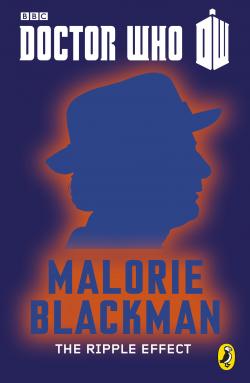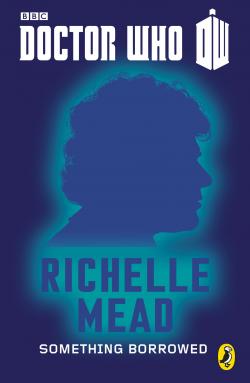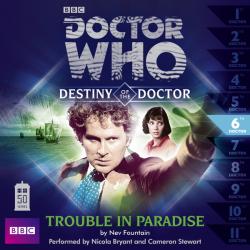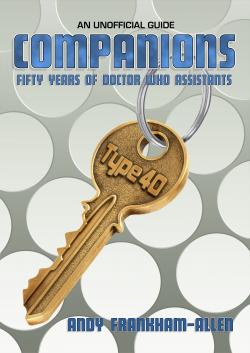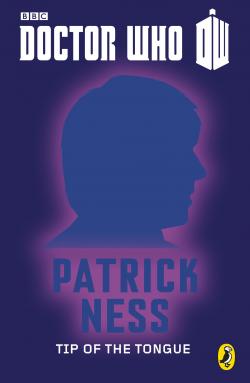Destiny of the Doctor: Shockwave
Saturday, 27 July 2013 - Reviewed by
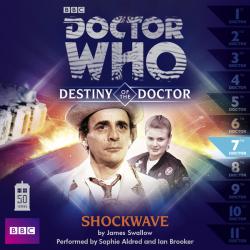
Destiny of the Doctor: Shockwave
Released by AudioGo
Produced by Big Finish
Written by James Swallow
Directed by John Ainsworth
Released: July 2013
"So, seventh time lucky then. Hello, me! I’m sure you remember getting the previous six of these, so you know the drill- I’m in an awful bind, and I need your help to get out of it. In fact, I need all of me to help...me!"
As listeners move into the seventh instalment of AudioGo’s Destiny of the Doctor series, they’d be forgiven for having initial concerns that a predictable and less compelling experience may await them within. Indeed, when James Swallow’s Shockwave opens to a dystopian-esque intergalactic society on the brink of collapse, with the Seventh Doctor and Ace forced onto a rescue cruiser in an attempt to escape an oncoming apocalypse, it’s only natural that an inherent sense of déjà vu begins to kick in.
Nevertheless, once Shockwave moves past its premise and into deeper and darker territory, it becomes far more than the sum of its predecessors’ parts, evolving into a great standalone release in its own right. At times, it channels recent episodes of post-2005 Doctor Who such as The Impossible Planet/The Satan Pit, The God Complex and even The Rings of Ahkaten, yet equally the approach here regarding faith and moral dilemmas around it feels fresh when placed in the context of the Seventh Doctor’s era. It’s arguable that just as last month’s Sixth Doctor tale Trouble In Paradise managed to break through the confines of the televised era on which it was based, so too does this month’s outing benefit from a lack of financial and perceptual constraints to great success.
It’s notable to recognise that much of this release’s success derives from the strength of its central narrator. Sophie Aldred’s Ace was a divisive companion to say the least in the final years of Doctor Who’s ‘classic’ era, yet here she gives a stunning performance both in character and in terms of relaying the action of the storyline. From her cavalier and apt rendition of Sylvester McCoy’s Doctor to her adaptive style of narration that suits the varying pace of the tale, Aldred boasts an incredible range of talents over the course of her contribution that won’t soon be forgotten by this particular listener. Ian Brooker provides fine support in the role of a courageous captain whose implications on the wider Destiny arc are still to be revealed, but it’s undeniable that this release’s returning cast member is its star.
In the past few months, the matter of the Eleventh Doctor’s various cameos in these Destiny tales has been a point of contention for this reviewer. Shadow of Death, Babblesphere and Trouble In Paradise all boasted effective uses of the pseudo multi-Doctor nature of their narrative structure, while lacklustre instalments such as Vengeance of the Stones showed that some writers on the roster found integrating the latest Time Lord more of a challenge. To its credit, Shockwave’s use of Matt’s incarnation is handled in an intriguing manner, posing more hints at what shape the November finale The Time Machine could hold for the incumbent eleventh incarnation than we’ve heard before. Sufficed to say that if Matt Fitton doesn’t manage to live up to expectations with the aforementioned final instalment in four months’ time, it will truly be a crying shame given the success of building such an ambitious arc.
However, despite a wealth of successes in terms of effective moral dilemmas and a strong narrator, Shockwave isn’t devoid of blemishes. This reviewer has their own qualms with Ace as a character moreso than Aldred as an actress, and at times Swallow’s script affords the final televised classic companion a few lines of dialogue which portray her in an extremely childish and foolish light unbefitting of her overall depiction here. Ace’s interaction with a young girl aboard the rescue cruiser perhaps echoes conversations witnessed in The Beast Below and Rings a little too heavily at times, and the listener may find himself or herself wondering whether Swallow utilised already established source material rather than his own imagination to inspire their discussions. A reluctance to innovative such as this is by no means a proverbial deal-breaker, but should be taken into account nevertheless so as to at least provide a critique on what this release as a whole could have improved.
If a single word can be used to assert the overall effect of Shockwave on veteran followers of the Destiny arc, it would likely be ‘reinvigorating’. While as an audio drama and a new instalment of classic Doctor Who it has its imperfections, this is yet another sterling release in an impressively consistent season which has yet to provide us with any truly dismal or lacklustre experiences. Whereas Trouble In Paradise perhaps felt somewhat too familiar, lulling the listener into a worrying sense of fore-knowledge barely halfway through the run, Shockwave takes the listener’s expectations and throws them out of a metaphorical window, innovating upon what we know while raising some superb moral dilemmas along the way with a strong level of ambiguity to boot. More than anything, Shockwave does seem to reinvigorate the Destiny franchise as a whole, leaving this particular listener ecstatic to hear what the final four monthly instalments have to offer.
